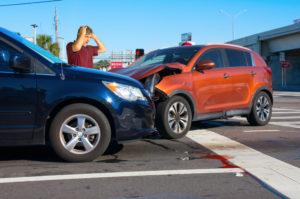

Yes, a police officer and insurance companies may use anything you say after a traffic accident against you. In cases where you file an insurance claim, admitting fault at the accident scene may cost you the ability to receive compensation.
Ohio exercises a modified contributory fault law, which can decrease your compensation based on the percentage of fault assigned to you.
Miranda Rights for Criminal Cases
In most traffic accidents, you will not need to worry about Miranda Rights, but they are pertinent to emphasize our point. In short, the Miranda vs. Arizona decision was rendered in 1966, making reading specific rights mandatory before any law enforcement interrogation. Unless arrested for DUI or another criminal offense, you will not hear your Miranda rights, but it is essential to know them. They are:
- You have the right to remain silent.
- Anything you say can and will be used against you in a court of law.
- The right to stop answering questions at any time.
- You have the right to an attorney.
- The right to a public defender if you cannot afford a lawyer.
Although traffic accidents generally fall under civil court rather than criminal court, knowing the provisions of the Miranda decision are important. Suppose the responding officers do not advise you of your Miranda rights. In that case, you can still use them to protect yourself from criminal or civil ramifications.
For a free legal consultation, call (614) 538-1116
Understanding Contributory Fault
Contributory fault is defined under Ohio Revised Code Section 2315.33. Meaning in Ohio, there may be a percentage of fault assigned to both drivers in an accident.
For example, you may be partially at fault if you are making a right turn and fail to signal or have non-functioning brake lights and the other driver hits you. Failure to maintain your vehicle and signal a turn are both traffic violations. As long as you are not more than 50 percent at fault, you can collect partial compensation for the damages to your vehicle and any injuries suffered.
What to Say After an Accident
When you speak with law enforcement officers or the other driver at the scene, keep your statements short and factual. Do not elaborate or speculate – state the facts, such as:
- “I was traveling in that direction.”
- “I signaled for a right turn and began slowing without braking.”
- “I felt the impact as I reached the intersection and was beginning my turn.”
- “The impact pushed my car into the parked car just around the corner.”
If you can, speak with the police and exchange information with the other driver. In verbal communication, use short, factual statements. Rather than focus on what to say, it is more important to warn you of what not to say.
Click to contact our personal injury lawyers today
What NOT to Say or Do After an Accident
After a traffic accident, you may be dazed, confused, and perhaps not thinking clearly. Therefore, you must try to avoid doing and saying certain things. Among the things you should not do:
- Do not leave the scene until released or transported by ambulance.
- Do not skip medical treatment.
Contact the local police from the scene. If you are on an Ohio highway, the emergency number is #677. In residential areas dialing 911 will connect you. The list of things you should avoid saying includes:
- Don’t say, “I’m sorry,” as that implies guilt.
- Regardless of how minor an accident is, don’t say, “Let’s handle this between us.” Instead, always contact local law enforcement.
- Don’t say, “I’m not hurt,” or “I don’t need a doctor.” Always seek medical attention.
- Avoid posting on social media. An innocent post you may comment on three days after the accident saying you are okay can be used to deny medical compensation.
- Avoid agreeing to supply a recorded statement to an insurance adjuster. They may twist your statement or coax you into saying something that will limit your ability to claim compensation.
- Do not sign any statements from an insurance company.
It is often beneficial to seek guidance from a car accident attorney before dealing with insurance adjusters. They are masters of manipulation and can get you to say things that may reduce your right to compensation.
Complete a Free Case Evaluation form now
How to Discuss the Accident with an Insurance Adjuster
You must contact your insurance company after any accident, no matter who was at fault. You should make a courtesy call to your insurance as soon as possible after the accident. Go home, collect your thoughts, and then call. If you cannot call, designate a representative to call for you.
When you speak to your insurance company, use the same short, factual statement you did when speaking with law enforcement. If they request a recorded statement, it may be best to wait until you have discussed the matter with an attorney. Your insurance company is set up to make money. Paying out on a claim costs them money, so they do everything they can to lower the amount of compensation.
Discuss Your Claim with a Car Accident Lawyer Today
Bressman Law offers free case evaluations where we can discuss your statements made to police and how they can affect your claim. In any accident, you should receive compensation for your losses.
Call or text (614) 538-1116 or complete a Free Case Evaluation form








